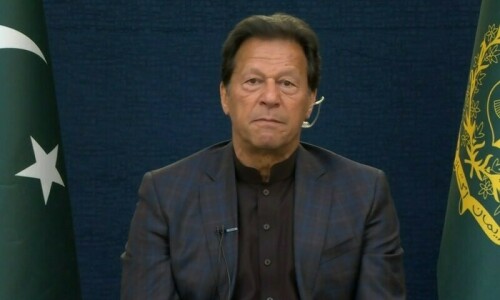In yet another blow to the electoral hopes of incarcerated former prime minister Imran Khan, the Lahore High Court on Wednesday turned down the PTI founder’s petitions challenging the decisions of the rejection of his nomination papers from NA-122 (Lahore) and NA-89 (Mianwali).
The decision came after a three-member LHC bench, headed by Justice Ali Baqar Najafi, heard the ex-premier’s petitions. The court upheld the decisions of the appellate tribunals and rejected Imran’s papers.
If he decides against pursuing the legal route any further, the 2024 general elections will not have Imran as a contesting candidate — a far cry from the 2018 polls when he had stood victorious on five NA seats.
Imran’s nomination papers had been rejected primarily on the grounds of being convicted in the Toshakhana case, in which he was sentenced to three years of imprisonment. The case, filed by the Election Commission of Pakistan (ECP), had accused Imran of not mentioning the details of state gifts in his tax declarations.
Later, the Islamabad High Court had set aside the sentence and ordered his release. However, he was not freed as he was undergoing trial in the cipher case.
Imran’s nomination papers from NA-122 were also dismissed on the grounds of the proposer not being a voter from the constituency.
The appellate tribunals had also upheld the decisions of the respective returning officers (ROs) with an observation that the conviction and sentence were two different terms as conviction pertained to the guilty verdict and sentence stands for the rigours following conviction.
The tribunals had noted that the conviction meant a guilty verdict pronounced by a court in reference to the delinquency attributed to an accused, whereas the sentence denoted the quantum of punishment.
Subsequently, Imran had filed two petitions in the LHC asking the high court to set aside the decisions of the ROs and the appellate tribunals of rejecting the nomination papers of the petitioner from both constituencies of the National Assembly.
During the previous hearing, Advocate Uzair Bhandari had argued on behalf of Imran that the conviction on the charge of moral turpitude did not fall under the definition of disqualification. He said the conviction of the petitioner could not be equated with the conviction for corruption or accumulating illegal assets.
He also pointed out that an Indian court enlisted the offence of moral turpitude lower than the offence involving financial corruption. However, the bench observed that the standards of morality in Pakistan were different from other regions.
Bhandari further argued that the RO had no jurisdiction to pass the impugned order on the basis of the conviction on moral turpitude. Meanwhile, a lawyer for the ECP argued that the conviction of the petitioner was still in force and he had not been acquitted by the high court.
Subsequently, the court had reserved its verdict on the petitions.













































Dear visitor, the comments section is undergoing an overhaul and will return soon.